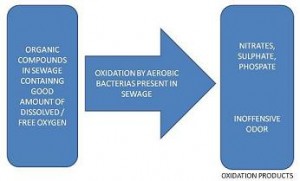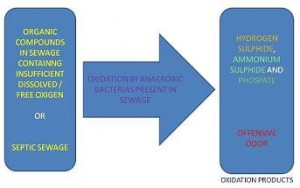

AEROBIC& ANAEROBIC OXIDATION
OXIDATION PROCESS IN SEWAGE WATER
Types of Bacterias in Sewage
- Aerobic Bacteria
- Anaerobic Bacteria
Sewage water (wastewater ) consist of both aerobic bacterias and anaerobic bacterias, These bacterias can make the oxidation of organic compounds present in the sewage water.
Aerobic Oxidation
In presence of a good amount of dissolved / free oxygen above 8 ml per liter organic compounds in sewage undergo a process of oxidation brought about by aerobic bacterias and the oxidation products are inoffensive smelling, non-putrefying nitrites, nitrates, sulphates, phosphates, etc. This kind of oxidation of sewage is called ” aerobic oxidation “.
 Anaerobic Oxidation
Anaerobic Oxidation
On the other band, when the dissolved or free oxygen supply is below a certain value, the sewage is called stale and anaerobic bacterias bring about petrification producing methane, hydrogen sulphide, ammonium sulphide and phosphate, which give offensive odor. This kind of oxidation of sewage is called ” anaerobic oxidation “. It may be pointed here that in an anaerobic oxidation. The bacterias extract combined oxygen contained in organic matter, nitrates, nitrites and sulphate of sewage ween the anaerobic decomposition is containing, the sewage is known ‘ septic sewage ‘.
3 Responses to “AEROBIC& ANAEROBIC OXIDATION”
Leave a Reply







 LIKE TO GET UPDATES
LIKE TO GET UPDATES  TO GET EXPERT GUIDE
TO GET EXPERT GUIDE
Thanks for the help and send stp oprator notes in my mail
Send the chemical name of Aerobic Bacteria, Anaerobic bacteria and also thumb rule to calculate the requirement of the same foe STP & ETP
Method of calculating the requirement of Aerobic Bacteria, Anaerobic bacteria and also thumb rule to calculate the same for STP & ETP